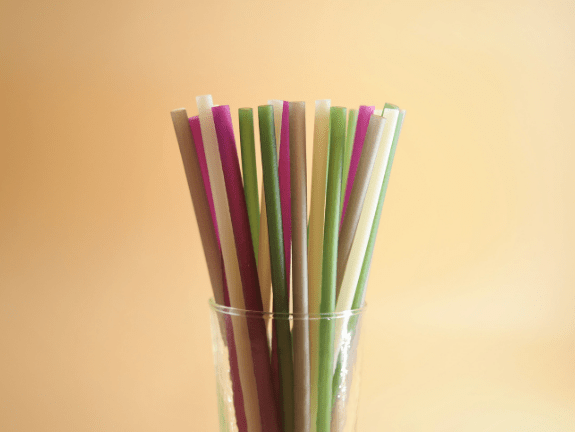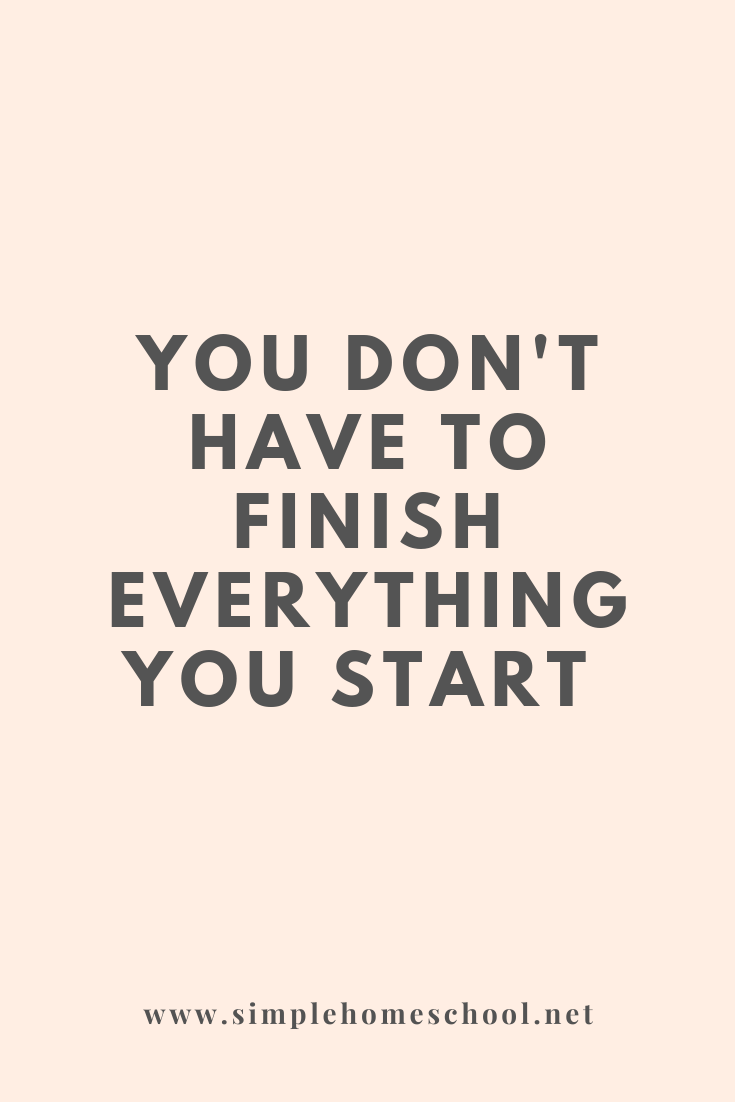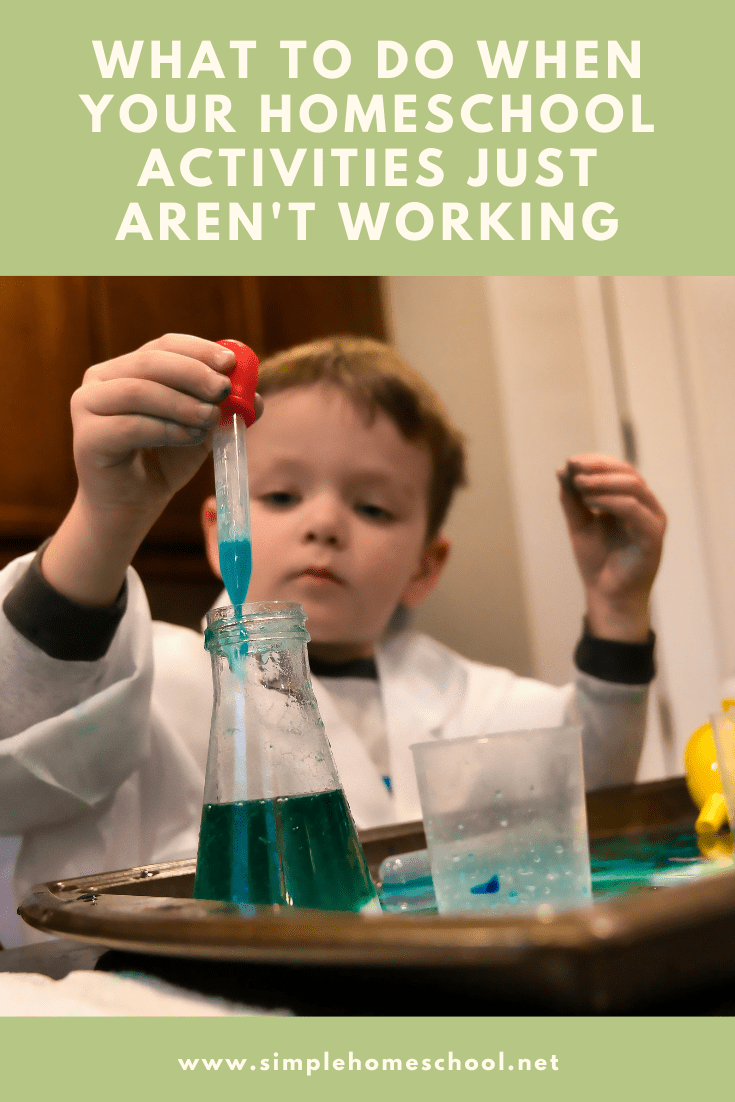 You Don’t Have to Finish Everything You Start ~
You Don’t Have to Finish Everything You Start ~
Written by Melissa Camara Wilkins
“Oh my gosh, science is terrible,” I whispered to my husband as we made dinner the other night.
I’d just spent an hour helping our youngest kids build “model animal habitats” out of plastic baggies and straws, according to instructions in a science experiment book. (I’m pretty sure plastic and straws are more like animal hazards than animal homes, but that wasn’t mentioned in the book.)
I was whispering because I didn’t want the kids to overhear me, in case they accidentally agreed with me.
Prefer to listen instead?
“I kind of hate science.”
“Um,” he whispered back, “don’t you have a degree in science?”
Oh. Right. That is true. Research, discovery, questioning and revising our understanding of the world around us… I am a big fan of all these things.
Wait a minute, now I remember! I don’t hate science. I love science!
You know what I don’t love?
I don’t love digging through boxes of “science supplies” to find brass fasteners and tiny mirrors and a water balloon only to realize we still need cream of tartar and a toothpick, both of which we probably own but neither of which can we find.

I don’t love setting up “experiments” for elementary schoolers that could just as easily have been learned via “explanations” or maybe “a short YouTube clip.”
I don’t love projects that leave seven-year-olds frustrated that their “model ant” doesn’t look anything like a real ant, and that the project doesn’t answer any of their actual, legitimate questions about, well, anything, including ants. (For example: How does each ant know where to sleep in the anthill? Who assigns jobs in the ant colony? What’s the biggest ant in the world, what’s the smallest ant in the world, which ants bite, etc., etc.)
I don’t love setting up, then slogging through a project, then cleaning up, at the end of which my kids say: “Yeah, we already learned that from Wild Kratts.” Wild Kratts!
Instead of spending the whole afternoon on this, we could have learned it in 22 minutes, with no sticky substances spilled on the kitchen table!

I don’t hate science. I love science. I just don’t love the thing we were doing that was supposed to get our kids excited about science.
This is probably okay, seeing as I don’t remember doing any of these activities during my own elementary school career, and my science education still turned out fine.
Plus—my seven-year-old? She’s my sixth child. All my older kids have learned all about science, without me ever following a recipe for making a giant batch of kinetic sand!
So why were we doing this at all? Do you know who purchased the box of science supplies and the book that told us what to do with them? IT WAS ME. (My seven-year-old may feel that she is very grown up, but she does not have her own debit card for random purchases of batteries, paperclips, and Styrofoam trays.)
We usually go for interest-driven options that allow for independent learning around here. No one was even asking for a book of science experiments, so why did I buy this one that requires me to do all the experimenting?
I guess I was worried that my kids wouldn’t learn the scientific method without it, so I clicked “buy now.” I’m not endorsing that train of thought—it lacks logic, or even, like, thinking two steps ahead—I’m just reconstructing the events that got us here.
Luckily, even though I seem to have forgotten an important life lesson about not buying stuff you don’t want to use, I have learned this: you don’t have to finish everything you start.

There are things worth sticking to, for sure. But if a learning activity is sucking the joy out of learning, or the life force out of you, or the love out of science, that is not a thing to hold on to.
If you (or your kids) suddenly hate science—or read-alouds, or history, or your morning routine—it’s probably not you, and it’s probably not science. (Just like it’s probably not books, or history, or mornings.) It might just be the WAY you’re doing those things.
When something just isn’t working, it’s at least worth asking the question: Is this how this kid learns best? Is this how I work best as a parent? Is there another way? Is there a way that we might find challenging, sure, but also rewarding? Is there one of those?
For us, for science, the answer was yes, there is a better way. There were lots of ways my kids were already learning about science, and they really didn’t need a box of magnets and paperclips and two sizes of eyedroppers to spark their interest.
It turns out, I didn’t buy the science stuff to meet an actual educational need. I bought it because of a momentary worry that we might be missing something. There’s a difference.
So I put the box of science supplies away in the closet where I hide things to see if anyone ever asks for them again. (So far, no one has.) I closed the door on the whole thing. We don’t have to finish everything we start, and this was one thing we could let go.
And you know what?
Just like that, I love science all over again.

Do you also need the reminder that you don’t have to finish everything you start in your homeschool? What’s something that you recently put away in your closet, LOL?!
What’s Your Homeschool Mom Personality? Take Jamie’s quiz now and receive a free personality report to help you organize your homeschool based on what your personality type needs most!

 Weekend homeschool links: March 19th
Weekend homeschool links: March 19th
Good advice. I can relate. I think science experiments are great . . . when my kids can mostly do them themselves! Hahaha. Or when somebody else wants to do them (grandparent, local university, etc). This is also why I picked exactly which experiments my 5th grader was going to do. They had to be ones he could mainly do himself or that I didn’t mind helping him with. When I’m planning our year I really try to think about what I’ll have energy for, because if I’m not happy, then really nobody is.
Jen’s latest post: Odds and Ends: March Edition
Yes! Planning for your own energy level is so wise.
Melissa Camara Wilkins’s latest post: How to Talk Back to Your Inner Critic
Love this. While I don’t hate our curriculums experiments, they are scheduled for Friday’s…and by end of the day Friday who wants to get all that stuff out. We have a literature based curriculum so most days are just reading which we love and I add in things that we find (life sized skeleton printout we labeled and added organs as we went along). After skipping experiments for the last 2 months we came up with a solution. During our spring break this week we had experiment day. We got it all out and did as many as we could stomach. We now have a jar with level marks watching evaporation and celery soaking in red food coloring water. And then they just played with anything they wanted for a few hours. It was lovely. We’ll do it again at the end of the year and finish up the last handful of experiments.
Love that solution!! That makes the whole thing into a fun event to look forward to. 🙂
Melissa Camara Wilkins’s latest post: How to Talk Back to Your Inner Critic
I so needed this today! Our plan for learning history has stalled out this year…and it’s not because we hate history–we love it! It’s because I just can’t find a good place in the week to do it.
Yes! Sometimes it’s just about logistics, not about history!! 😉
Melissa Camara Wilkins’s latest post: How to Talk Back to Your Inner Critic
Very refreshing and familiar words. Thank you.
Thanks, Jennifer! <3
Melissa Camara Wilkins’s latest post: How to Talk Back to Your Inner Critic
With experiments, the question is, what is the experiment supposed to teach the child? If the same information can be conveyed to the child another way, through maybe youtube videos then use it. I love using youtube videos for teaching. Pick the ones that convey the information most simply. I encourage my grandson that I homeschool, to research online, to seek information for himself and ask questions. He is 14 yrs old.
Asking questions is always the best starting point. Such an important thing to teach our kids. 🙂
Melissa Camara Wilkins’s latest post: How to Talk Back to Your Inner Critic
So I can stop feeling guilty for never getting to the science book and experiments??! Thanks 😊
Permission granted!! 😉
Melissa Camara Wilkins’s latest post: How to Talk Back to Your Inner Critic